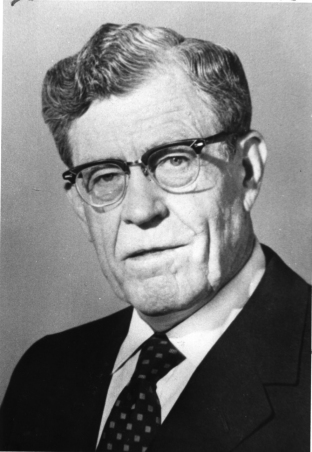
The Encyclopedia of Oklahoma History and Culture
McGEE, DEAN ANDERSON (1904–1989).
Petroleum geologist and philanthropist Dean Anderson McGee was reverently known early in his career as "the man with a nose for oil." The son of George Gentry McGee, an oil field wildcatter, and Gertrude Hattie Sayre, he was born in Humboldt, Kansas, on March 20, 1904. He attended public schools and graduated from the University of Kansas in 1926. He then went to work for the Bartlesville-based Phillips Petroleum Company, starting in the Texas oil fields. Phillips subsequently sent him to Peru to explore drilling possibilities. On his return to the United States he was assigned to the Oklahoma City Field, an area believed to have already been fully defined. McGee's investigations led him to advise Phillips to acquire all the leases it could on the periphery of the field and to drill deeper. He argued persuasively that other explorers had missed the main pool of oil. Acting on this advice, Phillips became the dominant driller in the Oklahoma City Field, and, subsequently, McGee became the company's chief geologist.
His demonstrated petroleum expertise attracted the attention of Ada native Robert S. Kerr, president of Anderson & Kerr Drilling Company. An attorney turned oilman, Kerr wanted to build an integrated company, one with operations in all phases of the petroleum industry from exploration to sale of refined products. He lured McGee to Anderson & Kerr by making him a vice president in 1937. Soon, McGee guided the drilling of the Barnett Number One well in Magnolia, Arkansas, to successful completion, proving his worth to a company teetering on the verge of insolvency. During this period drillers told stories of bringing core soil from the drill bit to McGee, who would smell it and then tell them how much farther to drill. His confidence often kept the drillers at work when they had not been regularly paid. Continued successful drilling led to McGee's increased involvement in management. In 1938 he married Dorothea Swain, a geologist he had met while working at Phillips.
McGee's ability to guide exploration activities while adding refining and distribution capacities gave Robert S. Kerr the luxury to become involved in politics, his abiding interest. In 1943 he became governor of Oklahoma. He retained the title of company president, moving to the governor's mansion after making McGee the chief of operations.
In 1945 McGee began studying the sea floor off the coast of Louisiana, because he was convinced that at least one-fifth of the world's oil could be found under the oceans. Using Governor Kerr's political influence, the company acquired a surplus World War II barge, mounted a drilling rig on it, and pioneered offshore exploration. McGee worked in close association with the crews, helping devise changes in techniques to make the transition from land to underwater drilling. He was rewarded for these efforts when the company name was rechristened Kerr-McGee & Company and by his promotion to president in 1946. Encouraged by his deep-sea triumph, he quickly moved into coal and uranium exploration and lumber and fertilizer production. He proclaimed that Kerr-McGee had become an energy company. Henceforth, it would specialize in using knowledge of geology to find things that could be turned into useful products. In 1954 the company's board of directors named him chief executive officer. Four years later he was inducted into the Oklahoma Hall of Fame.
Steady growth in all facets of company operations added to McGee's income and compensation, allowing him to engage in his passion, civic improvement. He became a founder, member, president, or director of more than sixty civic, charitable, and humanitarian organizations that benefited the City of Oklahoma City, the State of Oklahoma, the arts, and medicine. His philanthropic activities extended to the University of Kansas, the University of Oklahoma Health Sciences Center, the Dean A. McGee Eye Institute, the National Cowboy and Western Heritage Museum, the Oklahoma Heritage Association, the Oklahoma Historical Society, the Oklahoma Zoological Society, the Arts Council of Oklahoma City, and the Myriad Botanical Gardens and Crystal Bridge Tropical Conservatory. He retired from Kerr-McGee in 1983, devoting full time to those interests. On September 15, 1989, Dean A. McGee died in Oklahoma City after a brief illness. He was buried in Oklahoma City's Rose Hill Mausoleum.
See Also
FRONTIERS OF SCIENCE FOUNDATION OF OKLAHOMA, INC., ROBERT SAMUEL KERR, KERR-McGEE CORPORATION, PETROLEUM INDUSTRY






